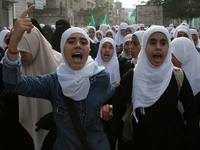Middle East: Let The Women Sort It Out!
Palestinian, Israeli and international women leaders call for an end to the siege on Gaza and a just and peaceful resolution of the Israeli-Palestinian conflict at conference supported by the Government of Spain

Women share a vision for Israeli-Palestinian peace
Concluding a two-day conference bringing together government leaders and nearly 100 experts on women’s human and political rights and the Israeli-Palestinian conflict, the International Women’s Commission for a Just and Sustainable Israeli-Palestinian Peace (IWC) reaffirmed their commitment to strengthening their joint action to call for concerted action to end the occupation and achieve a two-state solution based on the 4 June 1967 borders, and all relevant UN resolutions with Israelis and Palestinians living side by side in peace. An urgent priority highlighted by the IWC was the pressing need to end the siege on Gaza, which motivated the civilian-led humanitarian flotilla.
The conference, Advancing Women’s Leadership for Sustainable Peace in the Palestinian-Israeli Conflict and Worldwide , was supported by the Government of Spain and hosted by the United Nations Development Fund for Women (UNIFEM) and the IWC, a commission that brings together Israeli, Palestinian and international women leaders to speak in one voice for a just and sustainable resolution of the conflict. The meeting held in the Spanish Senate and opened by its President Francisco Javier Rojo Garcia, was convened in recognition of Spain’s Presidency of the European Union (EU) and to mark the ten-year anniversary of the passage of UN Security Council resolution 1325 on women, peace and security.
Since 2005, the IWC has advocated with decision-makers globally — from EU and US leaders to Security Council and Quartet members — as well as in their own countries to highlight the critical need to recognize women’s civil society leadership as participants in resolving the Israeli-Palestinian conflict, ensure that women have a place in all processes to negotiate peace, and take concrete steps to protect women from the specific ways that conflict affects them. The IWC calls for active third party involvement in resolving the conflict, in addressing the asymmetrical power relations between Israelis and Palestinians, and in stopping evictions in East Jerusalem, dismantling settlements and the wall, and ending the siege in Gaza. The IWC appeals to the EU to play a leading, proactive role at the political level and for the United Nations to serve as the main reference of any peace process. An Israeli member of the IWC noted: “We have 43 years of occupation, check points and humiliation. So many road maps and so few results.”
The meeting convened leaders from Spain and worldwide to share encouragement and ideas with IWC members on strategies for securing more effective action from the EU, international leaders and leaders in the region. Opening the conference, Inés Alberdi, Executive Director of UNIFEM, reminded participants that, “There are reasons for hope. Women in conflict-affected regions worldwide have successfully leveraged support for women´s leadership and inclusion at all stages of conflict resolution and peacebuilding as mandated by UN resolution 1325.” Addressing the conference, Hon. Leire Pajín Iraola, member of the Spanish Senate and IWC honorary member, reminded participants that “women in conflict countries worldwide have shown us how to tear down walls and build bridges to obtain sustainable peace.” Jody Williams, Nobel Peace Laureate and IWC honorary member, urged the Israeli and Palestinian participants to see th e attack on the flotilla as a tipping point and vastly scale up mobilization for peace, justice and women’s leadership in resolving the conflict.
Among key priorities for future action, the IWC highlighted the critical role that Spain and the EU can play in advocating for a more prominent and influential role for women’s human rights advocates in all processes related to resolving the Israeli-Palestinian conflict, the value that a Security Council mission to the region and a special session with Council members on women’s leadership in resolving the conflict could have, and the importance of mobilizing Israeli and Palestinian constituencies and leaders to demand concrete steps towards ending the occupation and achieving a sustainable two-state solution. As one Palestinian IWC member commented: “Radicalization of the Israeli and Palestinian societies is due to lack of hope. If we offer hope, the people will work tirelessly for peace.”
UNIFEM
Placed and adapted by
Konstantin KARPOV
Subscribe to Pravda.Ru Telegram channel, Facebook, RSS!


